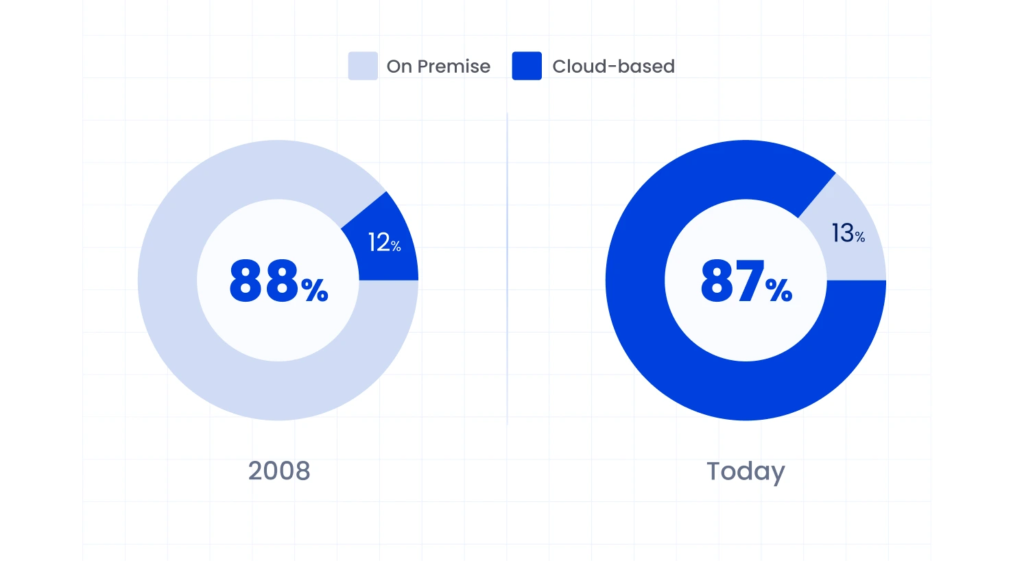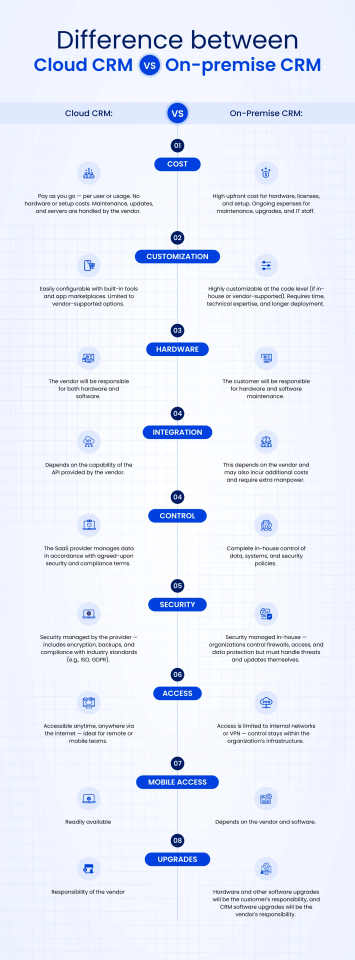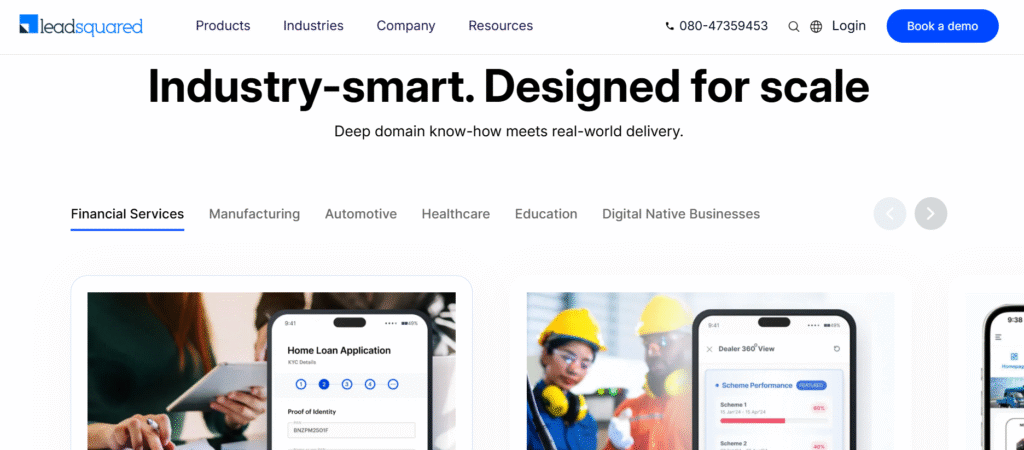The CRM industry is expanding rapidly, with projections indicating that it will reach USD 262.74 billion by 2032. Nevertheless, companies continue to struggle with a basic issue in spite of this momentum: should they invest in an on-premise vs cloud CRM? Even though 87% of CRMs are now cloud-based (a dramatic leap from just 13% in 2008), the debate between CRM cloud vs on-premises crm solutions still generates a lot of fervor in boardrooms around the globe.
The decision of on-premise CRM vs cloud CRM involves more than simply technology; it also involves matching your CRM approach to your long-term vision, budget, and business objectives. In this guide, we’ll weigh the benefits and drawbacks of each strategy to help you make an informed choice.
Decoding your requirements:
Before you set out to choose a CRM for your business, there are some questions that you should be asking yourself:
- Can you afford the upfront costs that come with building an in-house CRM?
- Is your business constantly expanding? In which case, would you require continuous upgrades and customisation?
- How confidential is the data that you will be handling and how important is security to your business?
- Do you have sufficient infrastructure and manpower in place that comes with an on-premise CRM?
- Do you use other software for your business activities and how would they interact with your CRM?
Once you have figured out the answers to these questions, you will have much more clarity. You will know whether you need to purchase a CRM or build one.
Cloud CRM: The modern standard
The world has been taken by storm (no pun intended), ever since cloud services were formally introduced way back in 1999. With Amazon Web Services fast becoming a leader in the segment, many followed. So, for the uninitiated, you may wonder what a cloud service is all about.
A cloud service is any service that a user may access via the internet. The actual program and servers are not located locally but rather available on the servers of the service provider.
Now, there are many CRM tools in the market that make use of cloud services. You can choose your vendor based on your requirements. (If you are a customer-facing business, make sure you choose a suitable CRM).
As we discussed earlier, only 13% of CRMs were hosted on a cloud server in 2013. The number has grown exponentially since then – to 87%. This is a huge indication of the adoption rates that cloud CRMs enjoy. The CRM cloud vs on premise trend has decisively shifted toward cloud solutions.

Let’s take a look at some of the pros and cons of having a cloud CRM vs an on–premise CRM.
Advantages:
- There is no need to dish out a huge sum as set-up costs as all the hardware and servers for running the CRM are hosted by the vendor.
- You don’t have to worry about maintenance and the additional costs and hassle that come with it, as it is the responsibility of the vendor.
- The service provider takes care of upgrades and other technological glitches. As these upgrades are handled externally, the deployment time of these updates is also less.
- As all the data is stored in the cloud, you have easy access to it. You can use the CRM anywhere, even when you are on the go.
- Hosting data in the cloud allows you to create mobile CRMs which take data from cloud servers while on the go. These apps can be hosted on app stores and downloaded by your team.
- Customisation of the software is easily and readily available through cloud services and can be deployed almost instantly.
- Service and Support: Most cloud service providers offer same-day or 24/7 customer support, so you can resolve any CRM-related issues quickly and conveniently—no dedicated IT department needed. Support teams can address problems remotely, even if you’re out in the field or meeting with a client.
- Implementation and setup: When it comes to getting started, a cloud-based CRM really shines. Since there’s no hardware or local equipment to worry about, implementation is a breeze. The SaaS model means you can often get up and running in a matter of days—or sometimes even hours—without waiting for new servers or complex installations. This cloud vs on premise installation difference not only minimises downtime but also eliminates large capital expenses typically associated with traditional IT infrastructure.
Disadvantages:
- You do not have complete control of your data and systems. The data is still hosted on another server.
- Autonomy about when you want to upgrade the system is not in your hands.
- Downtimes may occur when the servers are upgraded or repaired. These are not under your control and could clash with your work.
- You may need to contact the vendor’s support if something breaks, which is not an ideal situation in most cases.
On-premise CRM: Control and customisation
These CRM solutions are built by a company for their own use, because. some companies prefer not to let a third-party vendor handle their data. This is especially true of companies handling sensitive information such as banks and insurance companies.
Building a CRM on their own premises would incur a lot of initial set-up costs. This involves hiring new people to build the software or outsourcing it to another vendor. Purchasing and installing the necessary hardware would also burn a hole in your pocket. Additionally, you may have to be ready to incur occasional maintenance and updating costs.
Implementation and setup
Implementation times for on-premise CRM can vary widely, depending on the business and the provider. Unlike cloud-based solutions, you’ll need to install dedicated servers, configure the software, and ensure everything is running smoothly. This process can be time-consuming and almost always adds extra costs—not just for the initial setup, but for ongoing management and future upgrades as well.
One thing that you have to remember while building your CRM is that you have to create a disaster management system. You should build a backup system that is kept far away from the original location. This is to avoid any losses or damage as a result of accidents or natural disasters.
Here is a list of the benefits and drawbacks of using an on-premise CRM for your business.
Advantages:
- You get complete control of all your data and systems. You can decide and plan your upgrades, downtimes, and customisations.
- Since your CRM data is hosted on your own servers, risks related to third-party breaches are minimised. However, like any system, it’s still important to protect against internal misuse and external hacking attempts.
- If you have a large number of users, then you can actually save money. Many CRM vendors charge based on the number of users. Building your own CRM can be prudent in the long run.
Disadvantages:
- Users will not be able to access the system from anywhere. It would be controlled based on location or IP addresses.
- Building a mobile CRM app can be a hassle, as most low-code and app-building platforms rely on cloud servers for deployment and data management.
- Upgrading your software is expensive, and deployment can also take a while.
- Service and Support: With an on-premise CRM, maintenance and troubleshooting largely fall on your internal IT team. If you don’t have in-house expertise or round-the-clock support, resolving issues can take time. Unlike cloud CRMs where vendors handle most technical problems remotely, on-premise systems require your team (or an external technician) to fix issues on-site — which can lead to longer downtime if the problem is complex.
- Requires upfront and maintenance costs. This can be costly for a small or medium-sized business.
Cloud vs On-premise CRM: An overview
Take a look at this infographic that summarises everything we have discussed so far. It highlights the main differences of a CRM cloud vs on premise and will help you choose the best fit.

Key considerations for choosing
- Budget and cost structure: Decide if your business is ready for the higher upfront cost of on-premise infrastructure or would benefit more from the steady, subscription-based pricing of a cloud CRM.
- Scalability and growth plans: Consider how quickly your business is expanding. Cloud CRMs offer instant scalability with flexible user additions, while on-premise solutions require hardware upgrades and longer deployment times for scaling.
- Data Security and compliance requirements: Assess your industry’s regulatory needs and data sensitivity. While cloud providers offer robust security certifications, businesses with stringent compliance mandates (like certain financial or healthcare organisations) may require on-premises control.
- IT resources and technical expertise: Determine if you have dedicated IT staff to manage servers, handle maintenance, troubleshoot issues, and deploy updates—essentials for an on-premise CRM. Cloud solutions eliminate this burden entirely.
- Remote access and mobility Needs: If your sales teams work remotely or need access on-the-go, cloud CRM’s anywhere-anytime accessibility is crucial. On-premise systems typically restrict access to specific locations or require complex VPN configurations.
What can a modern cloud CRM do for your business?
Here’s how these platforms step up to the plate:
- Centralised contact management: Store and manage all your customer data in one secure, always-accessible location—whether you’re at HQ or stuck in Monday traffic.
- Client communication tracking: Log emails, calls, and meetings, so your team always knows the latest activity with every client.
- Flexible scaling & customisation: As your business grows or pivots, most cloud CRMs (think LeadSquared or Salesforce) let you add users, modules, and features—without IT headaches.
- Mobile access: Stay productive on-site, on the road, or even during surprise coffee emergencies, thanks to robust mobile apps and web access.
- Powerful database organisation: Organise leads, accounts, documents, and project details for lightning-fast retrieval and updates.
- Marketing & campaign tools: Run targeted email or direct mail campaigns, track their effectiveness, and coordinate your team’s efforts—all from the same dashboard.
- Workflow and task automation: Set up automatic lead assignments, alerts, and follow-up reminders so nothing slips through the cracks.
- Integration Superpowers: Connect your CRM with tools you already use—QuickBooks for finance, Trello for projects, Mailchimp for marketing, or Slack for collaboration. Plus, easily integrate industry tools like Shopify, Clio, or Mindbody to streamline your operations.
- Sales pipeline & lead tracking: Visualise every deal’s stage, automate follow-ups, and quickly spot where things are stalling.
In short, a modern cloud CRM isn’t just a digital rolodex. It’s the Swiss Army knife for managing your business relationships, streamlining operations, and helping your team collaborate—no matter where everyone happens to be.
Popular cloud CRM systems
So, what are some well-known examples of cloud-based CRMs making waves in the business world? Some of the biggest players include solutions like LeadSquared, Salesforce, HubSpot, and Zoho. These platforms are all web-based, meaning you can access your customer information, track leads, and monitor sales performance anytime, anywhere—as long as there’s an internet connection.
Each of these options brings its own unique features and pricing models, so it’s worth exploring which one aligns best with your team’s workflow and budget.
Why LeadSquared is your go-to cloud CRM partner
When it comes to choosing a cloud CRM that delivers on both functionality and ease of use, LeadSquared stands out as a comprehensive solution built for modern businesses. Designed specifically for high-velocity sales teams and marketing-driven organisations, LeadSquared combines powerful lead management, marketing automation, sales execution, and service management tools in one unified platform. Whether you’re in education, healthcare, financial services, or any customer-facing industry, LeadSquared’s industry-specific solutions ensure you’re not just getting a generic CRM—you’re getting a system tailored to your unique workflows and challenges.

What truly sets LeadSquared apart is its commitment to driving results without the complexity. Unlike traditional CRMs that require extensive training and IT support, LeadSquared offers an intuitive interface that gets your team up and running in days, not months. The platform’s cloud-based architecture means automatic updates, 99.9% uptime, and the flexibility to scale as your business grows—all without the hefty infrastructure costs of on-premise solutions.
It has seamless integration capabilities, mobile-first design, and robust analytics; so that your teams are empowered to capture, nurture, and convert leads faster while maintaining complete visibility across the customer journey. With dedicated customer success managers, 24/7 support, and a proven track record of helping businesses increase conversions, LeadSquared isn’t just a CRM provider—it’s a growth partner invested in your success.
In Conclusion
Now that you understand the scalability, flexibility, and cost-effectiveness of cloud CRM tools—and the customization, security, and compliance benefits of on-premise CRM software—the key question is: which option best fits your business needs?
Taking the time to evaluate your unique business requirements will help you determine whether a cloud-based or on-premises CRM aligns best with your goals, resources, and long-term vision.
And, if you’d like to see how LeadSquared can help you, schedule a personlised walk-through today!
Frequently Asked Questions (FAQs)
What is the main difference between on-premise and cloud CRM systems?
The primary difference lies in where the CRM software is hosted and managed. On-premise CRM is hosted on your company’s own servers and infrastructure, giving you complete control over data and customisation. Cloud CRM lives on the vendor servers and is accessed via the internet, offering flexibility, lower upfront costs, and remote accessibility without the need for in-house IT infrastructure.
Which is more cost-effective: cloud CRM or on-premise CRM?
For most small to medium-sized businesses, cloud CRM is more cost-effective thanks to lower upfront costs, subscription-based pricing, and minimal maintenance responsibilities handled by the vendor. In contrast, on-premise CRM requires a significant initial investment in hardware, software licenses, and IT personnel—and also incurs ongoing costs for system updates, server upkeep, and technical support. However, it may become cost-effective for large enterprises with extensive user bases over time.
Is cloud CRM secure enough for sensitive business data?
Yes, modern cloud CRM providers like LeadSquared invest heavily in security measures including disaster recovery, data encryption, regular security audits, compliance certifications (such as ISO 27001, SOC 2, and GDPR), and advanced threat detection. However, if your organisation handles extremely sensitive data or has strict regulatory requirements, you should carefully evaluate the security protocols of your cloud vendor or consider a hybrid approach.
Can I switch from on-premise CRM to cloud CRM (or vice versa)?
Yes, migration between on-premise and cloud CRM systems is possible, though it requires careful planning. Moving from on-premise to cloud typically involves data migration, system integration, and employee training. Many CRM vendors offer migration support and tools to facilitate the transition. The complexity and cost of migration depend on the size of your database, customisation level, and integration requirements, so it’s important to work with experienced consultants or your CRM vendor’s support team.
Onsite vs. Online CRM Implementation: Which approach works best for hospitals?
Healthcare institutions face unique challenges when choosing between on-premise vs cloud-based CRM solutions. Hospitals must balance stringent regulatory requirements (like HIPAA compliance), patient data security, and the need for seamless integration with existing health information systems.
Cloud-based CRMs offer hospitals several compelling advantages. They provide rapid deployment, automatic compliance updates, and the ability to access patient relationship data across multiple locations and departments—critical for multi-site hospital networks. Cloud solutions also reduce the IT burden on already-stretched healthcare technology teams, allowing them to focus on patient care systems rather than CRM infrastructure maintenance.
However, some hospitals with highly sensitive data or specific regulatory concerns may prefer on-premise solutions that offer complete control over where patient information resides. Large hospital systems with substantial IT resources may find that an on-premise approach allows for deeper customisation to fit complex workflows unique to healthcare delivery.
The verdict? For most modern hospitals, especially those looking to improve patient engagement, streamline appointment scheduling, and enhance care coordination across departments, a cloud-based CRM offers the best balance of functionality, security, and cost-effectiveness. That said, larger healthcare networks with dedicated IT infrastructure and stringent data residency requirements might still find value in hybrid or on-premise deployments.
How can an all-in-one cloud field service CRM solution help grow a contracting business?
If you’re in the contracting business—be it electrical, HVAC, plumbing, or any field service—making the jump to an all-in-one cloud CRM could be the game-changer you’ve been waiting for.
Here’s how a cloud-based field service CRM can help supercharge your operations and fuel your company’s growth:
Centralised Operations: No more hunting through endless spreadsheets or sticky notes. A unified CRM brings all your customer info, job schedules, invoices, and communications under one digital roof. Everything is organised, searchable, and updated from wherever you are.
Streamlined Workflow: Whether your team is out on assignments or your coordinators are managing a full day of bookings, cloud CRMs make updates and job tracking a breeze. Automatic notifications and real-time status tracking keep everyone in sync.
Anytime, Anywhere Access: All you need is an internet connection—pull up job details, customer histories, and quotes right from your mobile device or tablet in the field. Perfect for teams always on the move.
Enhanced Customer Experience: Quickly send estimates, follow up on leads, and respond to client queries without delay. Happy customers translate directly into more referrals and repeat business.
Data-Driven Decisions: Most cloud CRMs offer reporting tools that let you spot bottlenecks, monitor sales performance, and identify your top customers or services. In other words, you’ll be better equipped to make smart decisions as your business grows.
Integration with Other Tools: Integration with Other Tools: Cloud CRMs often integrate easily with accounting platforms like Tally or QuickBooks, email marketing tools such as Mailchimp, and payment gateways like Razorpay or Paytm. This means less manual data entry and more automated, connected workflows.
To sum up: investing in a cloud field service CRM involves more than just “going digital.” It’s about making your entire business more agile, responsive, and ready to scale , all while lightening the load for you and your team.








